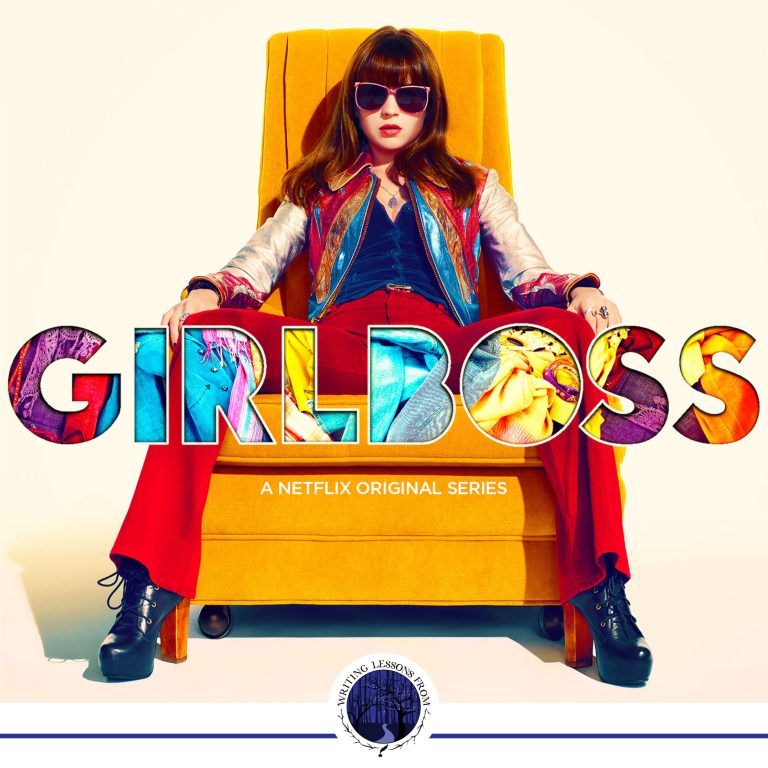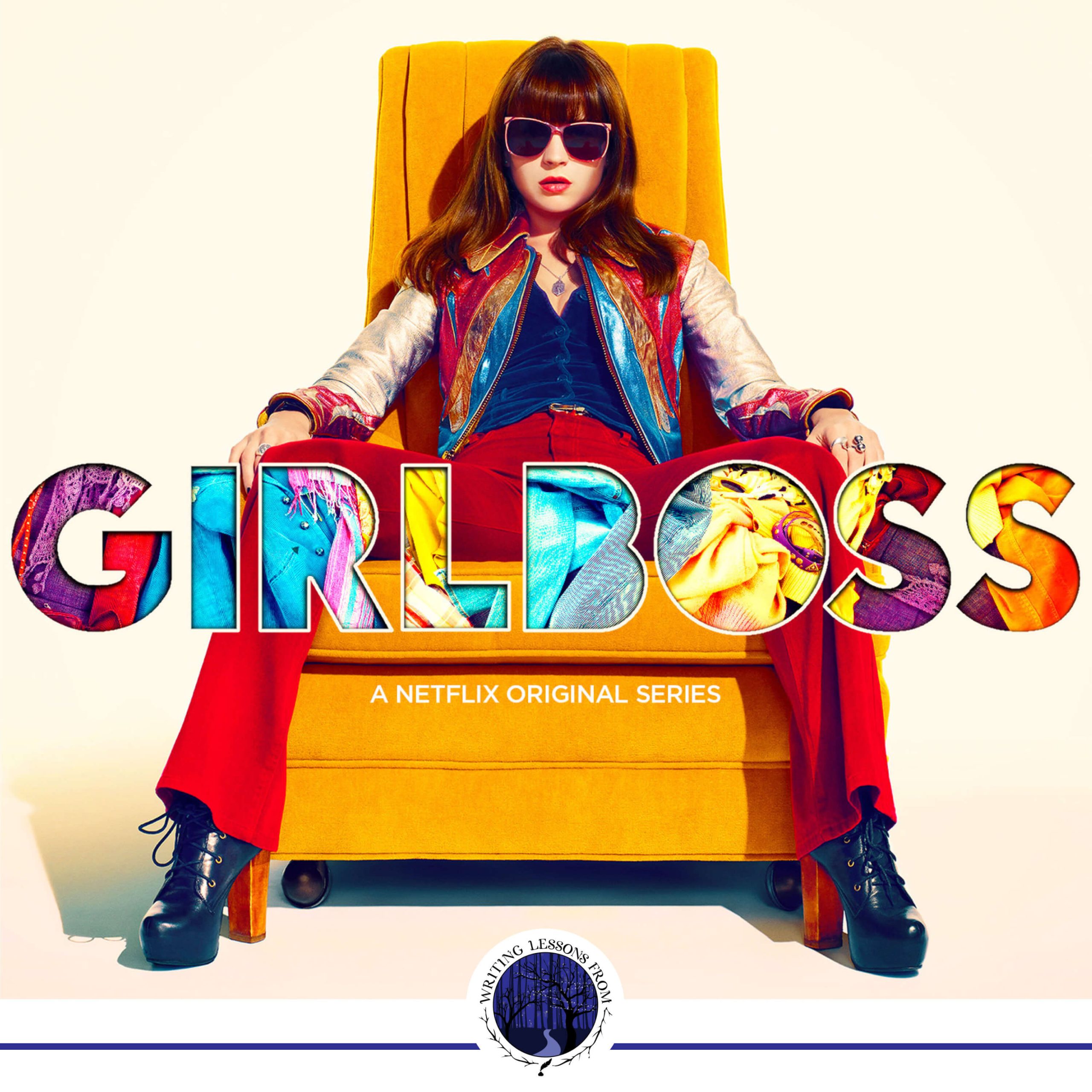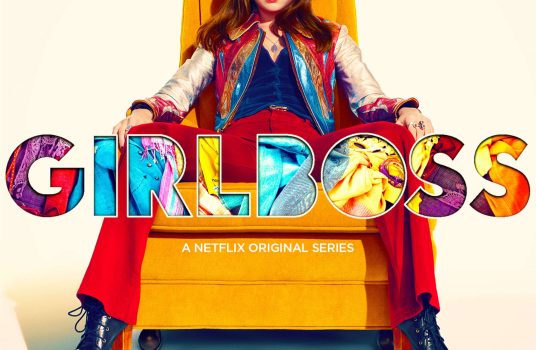Writing Lessons From... Girlboss aka Writing the End When it's Not the End
Listen to the blogcast of this episode:
How do you feel about stories based on truth? I have mixed feelings (the best thing I’ve seen based on a true story is the movie Tag, currently on Netflix).
Girlboss is a one-season TV show based on the true story detailed in Sophia Amoruso’s autobiography #Girlboss, of how Sophia started the clothing company Nasty Gal.
The TV show follows Sophia, along with her best friend Annie, handsome drummer Shane and Annie’s business school bartending boyfriend Dax.
I stumbled upon Girlboss late – my mum watched it and mentioned it to me maybe a year or so ago (she’s very on the ball with these things) – and I ended up bingeing it over three days.
Reeling from mixed emotions, I looked up the true story behind it and wished I hadn’t.
Truth always seems to muddy fiction.
The reviews for Girlboss weren’t great, and I read them with interest, wondering if my high from the show came from watching it too fast.
Writing, I was reminded, is a subjective game.
You know the drill. From here on, there be spoilers.
(Girlboss is currently available on Netflix.)

First, a small disclaimer. I am a business owner and have a deep-seated fascination with films, documentaries and TV shows about business. I’m admittedly a little biased, and perhaps that’s why I actually quite enjoyed Girlboss when the reviewers didn’t.
It’s fun to watch the ups and downs of Sophia building her business, seeing things go wrong and watching how she handled them. Not to mention her metaphor of being caged when fighting between the urge for a regular paycheck and the need for freedom. I can’t express how much I related to that.
Overall, the story of Girlboss is very simple: Sophia can’t hack a normal job but she’s amazing at finding vintage clothes and reselling them, or altering them for a more modern look. That’s her skill and she’s determined to build a living out of it.
That’s it. Chuck in a handful of characters and relationships, and you’ve got a nice little TV show, right?
Well, only if it’s all handled correctly.
Those all-important characters…
The first thing I noticed about Girlboss is that Sophia isn’t a nice person. Sure, she’s got sass and a strong will, but she’s also rude and immature. More importantly, she’s unempathetic. It’s not a great start, being faced with a character you don’t like much, but maybe that’s her character arc? Maybe by the end, I’ll love her?
(Spoiler: I didn’t.)
The other characters were just so much…nicer. Her best friend Annie is the loveliest, Annie’s boyfriend Dax is even lovelier, and even love interest Shane had relatable good qualities.
I struggle with characters who I don’t like. Some authors and writers make a living out of creating detestable characters, so obviously they can work well.
The key to an unlikeable protagonist winning over a readership or audience is to give them something for the reader/audience to hold on to. Something nice, something relatable, a glimmer of hope.
I binged Girlboss over three days, so there must have been something good about Sophia in that first episode, right?
I’ve given this so much thought and I came up with a couple of reasons why I decided to stick with Sophia:
1) She kept failing, and so do I. I wanted to see how she overcame this, because of course she was going to overcome this. This was the glimmer of hope that I needed.
2) Her best friend was everything she wasn’t – kind, sweet, thoughtful. I wanted more of Annie.
Sticking around for a secondary character isn’t usually strong enough. If you want to write a horrible protagonist, please consider giving them something relatable or a glimmer of niceness right at the beginning, so you don’t alienate the people who might enjoy your story.
The truth is that a lot of why I kept watching came from Annie and her boyfriend Dax (where’s my business school friend when I need them?!). Annie’s optimism kept me going, it kept me riding high – and maybe that’s what it did for Sophia too. That was Annie’s role. She was the optimistic, happy-go-lucky support system. The character who told and punished Sophia when she crossed a line, which is something else horrible protagonists need.
Annie and Dax, along with Sophia’s relationship with Shane, gave the story depth. This wasn’t just a woman building a clothing business, it was the story of a woman falling in love when she was holding herself back, and getting hurt by the man who seemed so sweet.
It was also the story of a woman who had a strained relationship with her father and a non-existent relationship with her tearaway mother, which was lovingly explored in one episode.
Speaking of which, two episodes stuck out to me: the one when they go to LA to visit Shane and the one where Sophia goes looking for her mother.
The first gave a lovely insight into Annie and Dax’s relationship, the seriousness of their feelings and just how well-matched they were. Things that were not clear beforehand when it could be assumed that Annie might even be using Dax.
The latter episode showed us why Sophia is the way she is. You can create a horrible character surrounded by lovely people, but we need to know why they are the way they are. The why here is that Sophia takes after her mother, and her father did everything he could to raise Sophia with love when her mother left. By the end of the episode, Sophia realises this, realises she doesn’t want to make the same mistakes her mother has, and goes home a different, evolved person, taking the next step forward in her character arc.
In fact, it seems that all of the characters and their relationships grow and evolve quite well throughout the series, until we get to the end.
Why are endings so hard?!
I’m noticing a theme with these posts: endings are hard.
A lot of the reviewers of Girlboss declared the writing bad.
I disagree. I think the writing was good.
Until the end.
What a shambles the end was.
By this point, Sophia’s business, Nasty Gal, has grown to a new level. She has her own little warehouse, is launching a new and improved website, and has a small team behind her. Nasty Gal and Sophia are ready for the next level.
She’s fixed her friendship with Annie. Shane has cheated on her and she’s still in a lot of pain from that. And we haven’t seen her father since he showed he didn’t quite trust her business capabilities (a belief based understandably on all of her previous behaviour).
That’s not what happened in the final episode.
That’s the end!
I understand that the writers probably wanted to leave room for a second season, which we’ll never get as Girlboss was cancelled after season one, but come on!
What was the problem with the ending?
Subplots were not tied up.
It’s that simple.
And I can tell you now that one of the main (top three, at least) rules of ending a story is that all subplots must be tied up. For the love of cake. Please.
It’s not difficult. Here’s what I would have done:
Sophia realises through the website launch party and the sheer volume of people there supporting her that she doesn’t need Shane. That he can go to hell. She’s moved on.
In the corner of the party, Dax suggests to Annie that they get married and she agrees. Or, even sweeter, both their parents are there and meet for the first time in a show of goodwill and love (Dax explained in a previous episode how worried he is about introducing Annie to his parents).
And who’s that coming through the warehouse doors? Why, it’s Sophia’s father, arriving to support his daughter and tell her how proud he is of her.
Why is that difficult?
That wouldn’t have affected season two, would it? They still could have had Sophia and her dad falling out over something if they wanted that relationship to break further.
It’s almost as if the writers gave up on the final episode.
Which brings me back to the fact that writing is art.
All art is subjective, everyone will have a different opinion about it, but you should take pride in the things you create.
Do right by your story, make it the best you can. Give it well-developed characters with proper growth and a good ending with everything tied up. Give the people who watched/read to the end the closure they deserve.
You know what else I missed at the end? Real photos or footage of the real Sophia building Nasty Gal with captions about what happened next.
What’s the point in basing a story on real life if you don’t get the ‘here are the real people’ element? By omitting this, I jumped to the conclusion that Sophia really was that nasty gal, and someone not to aspire to be like after all.
But to think like that would be to realise I wasted six and a half hours of my life watching Girlboss. Instead, I learned a lot about writing, endings and art, and how can that ever be a waste.


